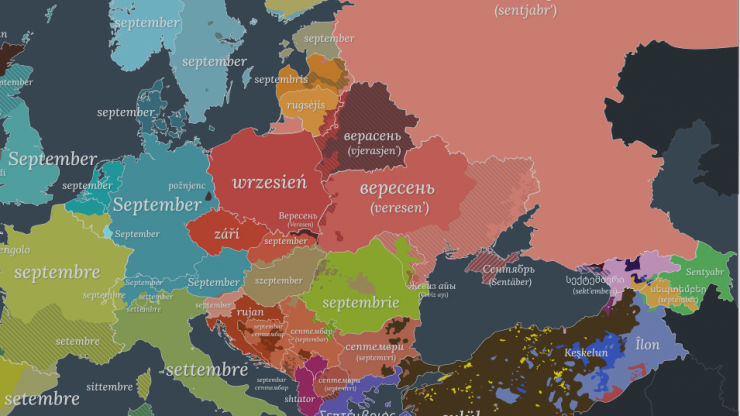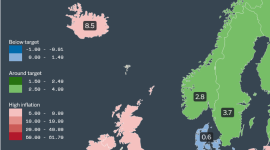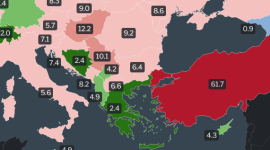It’s time to say goodbye to summer and welcome September. And a good way to welcome the month of September is to explore how the word September looks in different languages of Europe and to explore its etymology.
As always, there are two maps showing how September is written in different languages and countries in Europe. The first map shows different language groups and is an interesting overview. The second map shows grouping based on the word etymology.
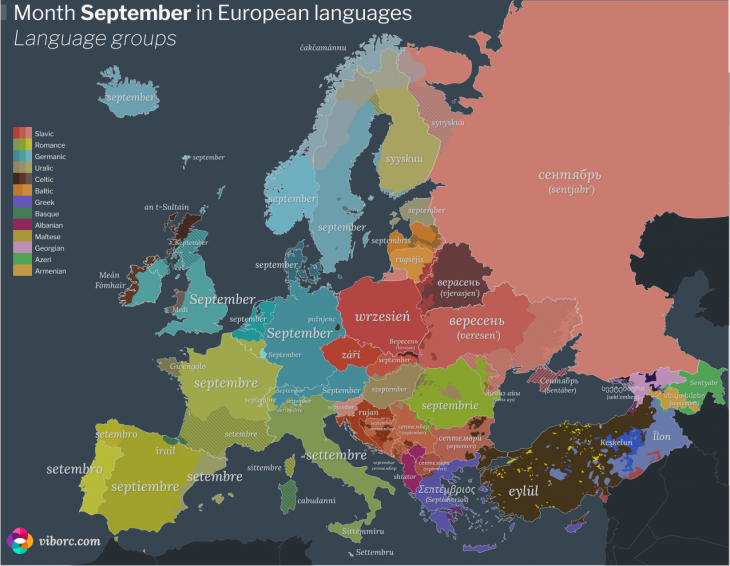
Common origin from Latin
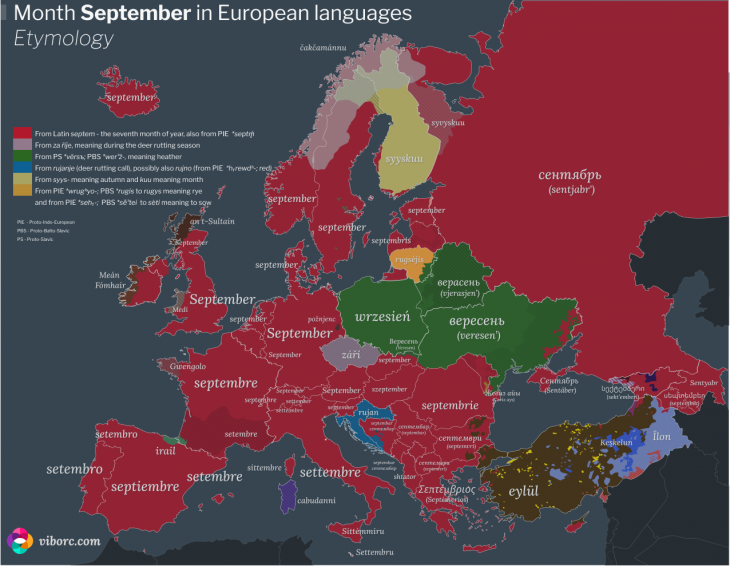
Origin of September and what does it mean?
The vast majority of European languages use some of the variations of the word September – regardless if it is:
- English (September),
- Spanish (Septiembre),
- Italian (settembre),
- Greek (Σεπτέμβριος/Septémvrios),
- Serbian (септембар /septembar),
- Russian (сентябрь/sentjabr’).
Even Georgian (სექტემბერი /sekt’emberi) and Armenian (սեպտեմբեր/september) draw from the same root.
That root is from the Latin word septem – meaning seven. Finally, the word septem itself draws from Proto-Indo-European *septḿ̥, again, meaning seven.
And lastly, an adjectival suffix -ber, from -bris is added. Again, we get the seventh month of the year.
How is September the seventh month of the Year?
So why the seventh when, today, September is the ninth month of the year?
The reason is that Romans used the calendar in which the first month of the year was March (before the Julian calendar reform in 46 BCE shifted the new year two months back).
Before that, the original Roman calendar was used, also known as the Calendar of Romulus shown here to illustrate the reasoning and origins of names better.
The Calendar of Romulus
| English name | Meaning | Latin Name |
|---|---|---|
| 1. March | Month of Mars | Mensis Martius |
| 2. April | Month of Aphrodite | Mensis Aprilis |
| 3. May | Month of Maia | Mensis Maius |
| 4. June | Month of Juno | Mensis Iunius |
| 5. July | Fifth month | Mensis Quintilis |
| 6. August | Sixth month | Mensis Sextilis |
| 7. September | Seventh month | Mensis September |
| 8. October | Eight month | Mensis October |
| 9. November | Ninth month | Mensis November |
| 10. December | Tenth month | Mensis December |
Croatian and Czech are related to deer rutting season
The Croatian word for September is rujan. It likely originated from the archaic word rujanje, which describes the rutting (mating) call of deer.
Another possibility for Croatian explanation is that the word rujno also means red or ginger, likely reflecting the leaves changing their color during this month (or from red wine). This likely draws from Proto-Indo-European *h₁rewdʰ– meaning red.
The Czech word září likely derives from za říje – again, meaning the deer rutting season, just like in the Croatian language.
Poles, Ukrainians and Belorussians are all about heather
Ukrainian (вересень/veresen‘), Polish (wrzesień ) and Belarusian (верасень/vjerasjen’) all derive from the same root meaning heather (Calluna vulgaris) – a plant commonly found in these regions and flowering in September
Lithuania breaks ranks from other Baltic states
The only Baltic state that doesn’t use September or some of its derivatives is Lithuania. Word rugsėjis comes from words for rye and for sowing:
- From Proto-Indo-European *wrugʰyo- and Proto-Balto-Slavic *rugis to rugys meaning rye
- From Proto-Indo-European *seh₁- and Proto-Balto-Slavic *sḗˀtei to sėti meaning to sow
A fascinating history of the Sardinian word for September
Sardinian language is especially interesting. The word cabudanni comes from the Latin phrase caput anni – meaning the head of the year. So, roughly it can be translated as the beginning of the year. And whose year usually starts in September? It’s Jewish Rosh Hashanah ( רֹאשׁ הַשָּׁנָה), which literally means head of the year – just like caput anni.
Looking back in the past, Sardinia was home to a modest but influential Jewish community whose first traces back to the year 19 when around 4000 Jews were exiled from Rome to Sardinia. And their influence on language didn’t stop in September; they also influenced word for Friday. But let’s leave that for another blog post.
Celtic languages, Finnish and Basque language
The Finnish language keeps it simple. Therefore, their word syyskuu derives from syys- meaning autumn and kuu meaning month. The same meaning has Northern Sami čakčamánnu – autumn month.
Celtic languages are, once again, outliers in their own charming ways.
Irish Meán Fómhair means the middle of harvest or, alternatively, the middle of autumn.
Scottish Gaelic and their expression an t-Sultain derives from the word sult meaning fat and -an, as an instrumental affix.
Welsh word Medi simply means reaping while Breton Gwengolo derives from the words gwenn meaning white and the word kolo meaning hay.
Basque word irail and its etymology were not something we were able to discover – if you have any tips, tweet us at @viborccom, and we’ll check it out.
ABOUT THE AUTHOR
